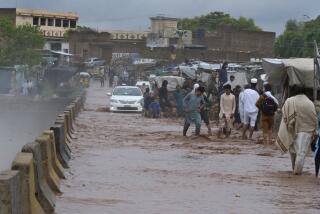Military officer led coup against Cuba’s Batista
Ramon M. Barquin, a Cuban military officer who was imprisoned after leading an unsuccessful coup against Fulgencio Batista in 1956, died of cancer March 3 at his home in San Juan, Puerto Rico. He was 93.
Barquin was the Cuban military attache to Washington from 1950 until 1956, when Batista summoned him to return to the island nation to lead its army. The island was simmering with opposition to Batista’s suspension of its constitution, repression of political dissidents and failure to call elections.
A popular military leader whose support Batista expected, Barquin quickly launched “the conspiracy of peers” in early April 1956 and led hundreds of army officers in an attempt to overthrow the U.S.-backed dictator. The coup failed almost immediately.
The leaders were arrested and court-martialed, and Barquin was sentenced to six years in prison on the Isle of Pines.
Batista purged the officer corps. Six months after the coup attempt, Fidel Castro landed in western Cuba and launched his guerrilla campaign, and Batista’s new officers proved unable to defeat it.
By the end of 1958, the Batista government was about to fall and the U.S. government, seeking a peaceful transition that might avert Castro’s ascension, urged the release of Barquin from prison.
Barquin was freed Jan. 1, 1959, the same day that Batista fled the country, and was installed by the Cuban Supreme Court as head of the army.
The Cambridge History of Latin America records that Barquin “ordered an immediate cease fire, saluted the insurgent ‘Army of Liberation’ and surrendered (a camp and military fortress) to Che Guevara and Camilo Cienfuegos. A week later Fidel Castro arrived in Havana.”
Barquin supported Castro’s land reforms but soon became disenchanted with the leader’s communist sympathies. Facing an ultimatum from Castro’s brother Raul to leave Havana, Col. Barquin took an ambassadorial post in Europe and by mid-1960 became an exile in the United States.
“The Communists are trying to create in Cuba an American Hungary,” Barquin warned in an Oct. 25, 1960, interview with the Washington Post.
He announced that he was working on an anti-Castro popular insurrection with the People’s Revolutionary Movement, which he described as a left-of-center, but non-communist, group in favor of restoring civil liberties, trade unions, private enterprise and redistribution of the country’s wealth though taxation, not confiscation.
He lived briefly in Miami, where many Cuban exiles opposed to Castro hatched plans for counterrevolution.
But by 1961, Barquin moved to Puerto Rico. There, he established a K-12 military school, summer camps, Atlantic College and an institute for civic education. Puerto Rico gave him its Educator of the Year award in 1995.
“Had his attempt against Batista been successful, there would have been no Castro, no Communists in Cuba, no Bay of Pigs, no missile crisis,” said his son, Ramon Barquin Jr.
“My father was always, always disappointed he could not have saved Cuba and the world a lot of grief.”
The senior Barquin was born in Cienfuegos, Cuba, on May 12, 1914. He enlisted in the army in 1933 and graduated from the Cuban Military Academy and Mexico’s Superior War College.
He also attended the U.S. Strategic Intelligence School. He taught in a number of military schools and became director of Cuba’s military school and chief of intelligence of the army.
He became vice chief of staff of the Inter-American Defense Board as well as the military representative of the Cuban government in Washington, where his name regularly turned up in the society columns during the 1950s. The United States awarded him a Legion of Merit in 1955 for his work.
He wrote five books in Spanish on Cuban history and on education, and his latest, “My Dialogues with Fidel, Raul and Che,” is scheduled for publication in the spring.
He became a marathon runner at 60 and ran the New York City Marathon 11 times, coming in second in his age group in his first race. In 1994, he won the 80-plus age category, with a time of 5 hours, 41 seconds.
His wife of 60 years, Hilda Barquin, died in 2004.
In addition to his son, survivors include a daughter, Lilliam Consuegra of San Juan; six grandchildren; and nine great-grandchildren.
More to Read
Start your day right
Sign up for Essential California for news, features and recommendations from the L.A. Times and beyond in your inbox six days a week.
You may occasionally receive promotional content from the Los Angeles Times.





